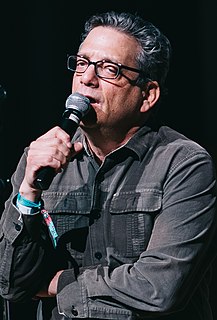A Quote by Raoul Peck
James Baldwin is probably, for me and for many other people, one of the most extraordinary authors in this country, black or white. And he is somebody who changed my life.
Related Quotes
I started to read James Baldwin very early on in my life. At a time, as a young adult in the Sixties, when there were not that many authors in whom I could recognize myself, he was an important guide and mentor to me, as he was to many others. He helped me understand who I was and decipher the world around me.
I started to read James Baldwin very early on in my life. At a time, as a young adult in the Sixties, when there were not that many authors in whom I could recognize myself, he was an important guide and mentor to me as he was to many others. He helped me understand who I was and decipher the world around me. He gave me the words to defend myself and the argumentative rhetoric to master discussions with others.
As a black person on the outside, because there's so much black art and so much of black people's work circulating, so many people imitating what black people do, you would think that there'd be more black people on the business side. It didn't cross my mind that every label head, for the most part, is a white guy.
Instead of accepting what James Baldwin called the "lie of whiteness," many people in lots of different fields and movement activities have tried to productively make it into a problem. When did (some) people come to define themselves as white? In what conditions? How does the lie of whiteness get reproduced? What are its costs politically, morally and culturally?
The strange thing about my life is that I came to America at about the time when racial attitudes were changing. This was a big help to me. Also, the people who were most cruel to me when I first came to America were black Americans. They made absolute fun of the way I talked, the way I dressed. I couldn't dance. The people who were most kind and loving to me were white people. So what can one make of that? Perhaps it was a coincidence that all the people who found me strange were black and all the people who didn't were white.
I've never seen a sincere white man, not when it comes to helping black people. Usually things like this are done by white people to benefit themselves. The white man's primary interest is not to elevate the thinking of black people, or to waken black people, or white people either. The white man is interested in the black man only to the extent that the black man is of use to him. The white man's interest is to make money, to exploit.
…“white supremacy” is a much more useful term for understanding the complicity of people of color in upholding and maintaining racial hierarchies that do not involve force (i.e slavery, apartheid) than the term “internalized racism”- a term most often used to suggest that black people have absorbed negative feelings and attitudes about blackness. The term “white supremacy” enables us to recognize not only that black people are socialized to embody the values and attitudes of white supremacy, but we can exercise “white supremacist control” over other black people.
It was really always about bringing back [James] Baldwin's words in all their rawness, in all their impact - in the way he analyzes not only this country but also the history of this country, the images that this country is fabricating through Hollywood, and what consequence that has in our imagination.
Republicans are just rich, old, white people - that's all they are. You ever see the Republican National Convention? All white people - six black people: paid actors. James Earl Jones in his most difficult, challenging role! Tune in and attempt to watch him look pleased during a George Bush speech. And Clarence Thomas - as himself.


































